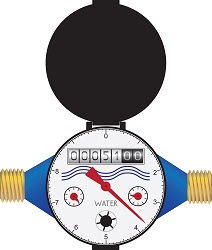Checking for Water Leaks
An unexpected, larger-than-normal water bill could lead a person to think that they might have a leak. Before incurring the cost of a plumber, it is fairly easy to run your own test. |
Locate your water meter. They’re usually in the front of the house, near the street. In some cases, you might need a meter key to open it; they can be purchased at Lowe’s, Home Depot or other hardware stores.
Step One - Write down the numbers on the meters to get a current reading. Don’t use any water for thirty minutes. If the meter shows water usage during the test period, proceed to step two.
Step Two - Shut off the valves to all of the toilets. If you have a pool with an automatic filler, it has a similar device. Repeat the test again for the same thirty minute period. If the numbers haven’t changed this time, it indicates that the toilets probably need servicing.
If the numbers have changed during step two, it is an indication there may be a leak and it will need to be tracked down. This could be the time to call a plumber or plumbing leak specialist. Your water department may have a consumer help line that can offer suggestions also.


